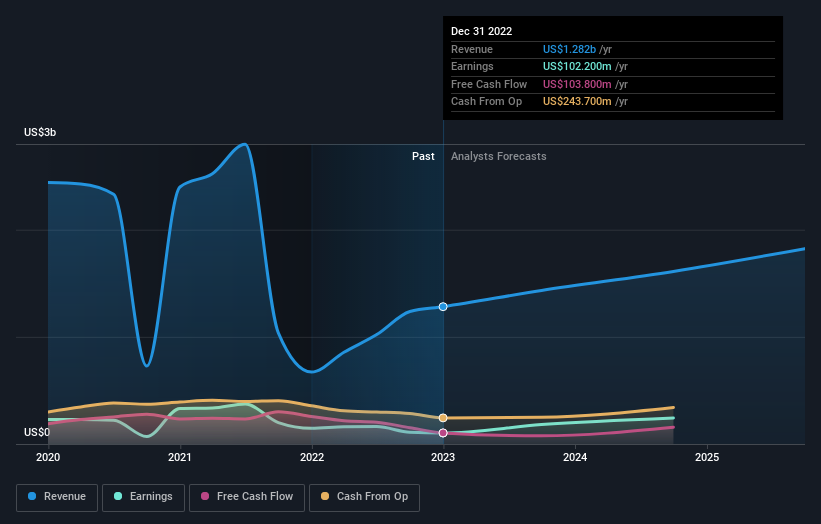Valvoline Inc. (NYSE:VVV), might not be a large cap stock, but it received a lot of attention from a substantial price movement on the NYSE over the last few months, increasing to US$37.03 at one point, and dropping to the lows of US$32.97. Some share price movements can give investors a better opportunity to enter into the stock, and potentially buy at a lower price. A question to answer is whether Valvoline's current trading price of US$35.02 reflective of the actual value of the mid-cap? Or is it currently undervalued, providing us with the opportunity to buy? Let’s take a look at Valvoline’s outlook and value based on the most recent financial data to see if there are any catalysts for a price change.
See our latest analysis for Valvoline
What's The Opportunity In Valvoline?
Valvoline appears to be expensive according to my price multiple model, which makes a comparison between the company's price-to-earnings ratio and the industry average. I’ve used the price-to-earnings ratio in this instance because there’s not enough visibility to forecast its cash flows. The stock’s ratio of 58.92x is currently well-above the industry average of 13.71x, meaning that it is trading at a more expensive price relative to its peers. If you like the stock, you may want to keep an eye out for a potential price decline in the future. Since Valvoline’s share price is quite volatile, this could mean it can sink lower (or rise even further) in the future, giving us another chance to invest. This is based on its high beta, which is a good indicator for how much the stock moves relative to the rest of the market.
What kind of growth will Valvoline generate?

Investors looking for growth in their portfolio may want to consider the prospects of a company before buying its shares. Although value investors would argue that it’s the intrinsic value relative to the price that matter the most, a more compelling investment thesis would be high growth potential at a cheap price. In the upcoming year, Valvoline's earnings are expected to increase by 92%, indicating a highly optimistic future ahead. This should lead to more robust cash flows, feeding into a higher share value.
What This Means For You
Are you a shareholder? VVV’s optimistic future growth appears to have been factored into the current share price, with shares trading above industry price multiples. However, this brings up another question – is now the right time to sell? If you believe VVV should trade below its current price, selling high and buying it back up again when its price falls towards the industry PE ratio can be profitable. But before you make this decision, take a look at whether its fundamentals have changed.
Are you a potential investor? If you’ve been keeping tabs on VVV for some time, now may not be the best time to enter into the stock. The price has surpassed its industry peers, which means it is likely that there is no more upside from mispricing. However, the optimistic prospect is encouraging for VVV, which means it’s worth diving deeper into other factors in order to take advantage of the next price drop.
So if you'd like to dive deeper into this stock, it's crucial to consider any risks it's facing. Be aware that Valvoline is showing 3 warning signs in our investment analysis and 1 of those can't be ignored...
If you are no longer interested in Valvoline, you can use our free platform to see our list of over 50 other stocks with a high growth potential.
New: Manage All Your Stock Portfolios in One Place
We've created the ultimate portfolio companion for stock investors, and it's free.
• Connect an unlimited number of Portfolios and see your total in one currency
• Be alerted to new Warning Signs or Risks via email or mobile
• Track the Fair Value of your stocks
Have feedback on this article? Concerned about the content? Get in touch with us directly. Alternatively, email editorial-team (at) simplywallst.com.
This article by Simply Wall St is general in nature. We provide commentary based on historical data and analyst forecasts only using an unbiased methodology and our articles are not intended to be financial advice. It does not constitute a recommendation to buy or sell any stock, and does not take account of your objectives, or your financial situation. We aim to bring you long-term focused analysis driven by fundamental data. Note that our analysis may not factor in the latest price-sensitive company announcements or qualitative material. Simply Wall St has no position in any stocks mentioned.
About NYSE:VVV
Valvoline
Engages in the operation and franchising of vehicle service centers and retail stores in the United States and Canada.
Proven track record with moderate growth potential.
Similar Companies
Market Insights
Community Narratives



